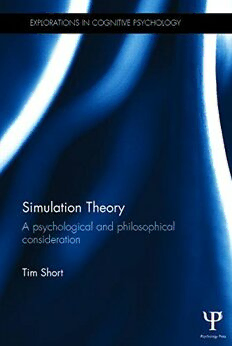Table Of ContentSimulation Theory
Theory of Mind (ToM) is the term used for our ability to predict and explain the
behaviour of ourselves and others. Accounts of this theory have so far fallen into
two competing types: Simulation Theory and ‘Theory Theory’. In contrast with
Theory Theory, Simulation Theory argues that we predict behaviour not by
employing a model of people, but by replicating others’ thoughts and feelings.
This book presents a novel defence of Simulation Theory, reviewing the major
challenges against it and positing the theory as the most effective method for
exploring how we know each other and ourselves.
Drawing on key research in the field, chapters reopen the debates surrounding
Theory of Mind and cover a variety of topics including schizophrenia with
implications for experimental social psychology. In the past, one of the greatest
criticisms against Simulation Theory is that it cannot explain systematic error in
Theory of Mind. This book explores the rapidly developing heuristics and biases
programme, pioneered by Kahneman and Tversky, to suggest that a novel bias
mismatch defence available to Simulation Theory explains these systematic errors.
Simulation Theory: A psychological and philosophical consideration will appeal to
a range of researchers and academics, including psychologists from the fields of
cognitive, social and developmental psychology, as well as philosophers,
psychotherapists and practitioners looking for further research on Theory of
Mind. The book will also be of relevance to those interested in autism, since it
offers a new approach to Theory of Mind which explains central symptoms in
autistic subjects.
Tim Short is currently studying for his second PhD in Simulation Theory
at University College London, UK. His first PhD was in particle physics,
focusing on Monte Carlo simulation and computerised modelling of physics
and electronics.
Explorations in Cognitive Psychology series
Perception Beyond Gestalt
Progress in vision research
Edited by Adam Geremek, Mark Greenlee and Svein Magnussen
Fine Art and Perceptual Neuroscience
Field of vision and the painted grid
Paul M.W. Hackett
Simulation Theory
A psychological and philosophical consideration
Tim Short
Simulation Theory
A psychological and philosophical
consideration
Tim Short
First published 2015
by Psychology Press
27 Church Road, Hove, East Sussex BN3 2FA
and by Psychology Press
711 Third Avenue, New York, NY 10017
Psychology Press is an imprint of the Taylor & Francis Group, an informa business
© 2015 T. Short
The right of T. Short to be identified as author of this work has been asserted
by him in accordance with sections 77 and 78 of the Copyright, Designs and
Patents Act 1988.
All rights reserved. No part of this book may be reprinted or reproduced or
utilised in any form or by any electronic, mechanical, or other means, now
known or hereafter invented, including photocopying and recording, or in any
information storage or retrieval system, without permission in writing from the
publishers.
Trademark notice: Product or corporate names may be trademarks or registered
trademarks, and are used only for identification and explanation without intent
to infringe.
British Library Cataloguing in Publication Data
A catalogue record for this book is available from the British Library
Library of Congress Cataloging in Publication Data
1. Cognitive psychology—Mathematical models. 2. Human behavior
—Mathematical models. 3. Philosophy of mind. I. Title.
BF201.S56 2015
128'.2—dc23 2014032193
ISBN: 978-1-138-81605-3 (hbk)
ISBN: 978-1-315-74637-1 (ebk)
Typeset in Galliard
by RefineCatch Limited, Bungay, Suffolk
Contents
List of figures viii
List of tables ix
Acknowledgements x
1 Introduction 1
2 Simulation theory: overview 7
Introduction 7
Why consider ST? 8
TT(Scientific) 10
TT(Innate) 13
ST(Replication) 15
ST(Transformation) 17
Further possible types of ST 18
On-line vs off-line 20
Avoiding collapse between ST and TT 22
Theory driven vs process driven 24
Setting the bar too low 25
3 The problem for ST 29
Introduction 29
The ‘too rosy’ challenge 31
The ‘too cynical’ challenge 33
The suspicious congruency challenge 36
The developmental challenge 40
4 Is going hybrid the solution? 43
Introduction 43
Objections to TT(Scientific) 45
vi Contents
Objections to TT(Innate) 53
Objections to hybridist accounts 56
Conclusion 65
5 Bias mismatch defence: background 68
Why we need a new defence 68
Bias mismatch defence: outline 73
Bias mismatch defence: biases involved 75
Affect mismatch 80
System mismatch 84
Interaction between affect mismatch and system mismatch 88
6 Bias mismatch defence: ‘too rosy’ evidence 91
Introduction 91
‘Too rosy’ data 93
7 Bias mismatch defence: ‘too cynical’ evidence 110
Introduction 110
‘Too cynical’ data 111
Discussion 118
8 Suspicious congruency 120
Introduction 120
Cognitive penetrability 122
Introspectionism 124
Self-perception theory 129
9 Partial simulation defence 136
Introduction 136
ToM as adaptive modelling 137
Unadapted modelling process 138
Adapted modelling process 140
Discussion 143
10 Simulationism and schizophrenia 146
Introduction 146
Impaired ipseity impairs ToM 151
Emotional disturbance impairs ToM 154
Paired deficits in experiencing and ascribing emotions 158
Contents vii
11 Conclusions 161
Bibliography 164
Index 177
Figures
5.1 Systematic simulation error routes 89
9.1 Decision tree for child in Ruffman experiment 139
Tables
2.1 Possible variants of ST 19
4.1 Ames’s four routes to mental state inference 59
5.1 Simulation error probability by system type of S and O 88
6.1 Response type by group studied: too rosy 93
7.1 Response type by group studied: too cynical 110
7.2 A ctual versus estimated number of individuals
volunteering to give blood for payment or no payment 116
8.1 Job applicant: factors 125
8.2 Job applicant: judgements 126
9.1 General format for adaptive modelling 137
9.2 SD: standard derivation 137
9.3 MD: modified derivation 138
9.4 General adaptive modelling strategy 138

